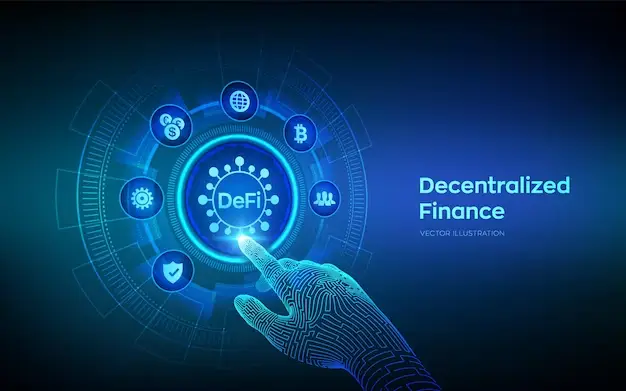In recent years, a groundbreaking financial phenomenon has taken the world by storm: DeFi, short for Decentralized Finance. DeFi represents a new paradigm in the financial industry, one that leverages blockchain technology to create an open, transparent, and permissionless financial ecosystem. This article delves into the world of DeFi, exploring its key features, advantages, challenges, and the transformative impact it holds for the global financial landscape.
What is DeFi?
Table of Contents
DeFi, or Decentralized Finance, refers to a revolutionary financial ecosystem that operates on decentralized networks like blockchain, offering a wide range of financial services without the need for traditional intermediaries such as banks or financial institutions. It leverages smart contracts, self-executing protocols with predefined rules, to execute transactions and provide services securely and transparently.
How Does DeFi Work?
At the heart of DeFi are smart contracts, which are self-executing contracts with the terms of the agreement directly written into code. These contracts automatically execute actions when specific conditions are met, without the need for an intermediary. DeFi applications, built on blockchain networks like Ethereum, utilize these smart contracts to offer a plethora of financial services, including lending, borrowing, trading, and yield farming.
The Core Principles of DeFi
Trustless Transactions
In the DeFi space, users can engage in transactions without the need to trust a centralized authority. Instead, they rely on auditable and transparent smart contracts to ensure the validity and integrity of every operation.
Decentralization
DeFi operates on decentralized networks, making it resilient against single points of failure. The absence of a central authority enhances security and fosters community-driven decision-making processes.
Interoperability
DeFi projects are designed to interact with one another seamlessly. This interoperability fosters innovation, as developers can combine different protocols to create new and advanced financial solutions.
The Advantages of DeFi
Accessibility and Financial Inclusion
DeFi has the potential to provide financial services to anyone with an internet connection, even those who are unbanked or underbanked. This opens up opportunities for global financial inclusion.
Eliminating Middlemen
Traditional financial systems often involve intermediaries, leading to delays and additional costs. DeFi eliminates these middlemen, allowing for direct peer-to-peer transactions.
Enhanced Security
The use of blockchain technology and cryptography ensures robust security, reducing the risks of fraud and hacks.
24/7 Availability
Unlike traditional financial services that operate within specific business hours, DeFi protocols are accessible 24/7, allowing users to conduct transactions at their convenience.
Lower Fees
DeFi transactions typically involve lower fees compared to traditional financial services, benefitting both users and businesses.
The Challenges of DeFi
Smart Contract Risks
Smart contracts are not immune to bugs or vulnerabilities, and if exploited, they can lead to significant financial losses.
Regulatory Uncertainty
As DeFi operates in a relatively unregulated space, there are concerns about potential legal and regulatory challenges that could emerge.
Scalability
As the popularity of DeFi grows, there are concerns about the ability of existing blockchain networks to handle the increasing transaction volumes effectively.
DeFi Applications and Use Cases
Decentralized Exchanges (DEXs)
DEXs facilitate peer-to-peer trading of digital assets without the need for an intermediary.
Decentralized Lending and Borrowing
DeFi platforms allow users to lend their digital assets to others and earn interest or borrow assets against collateral.
Yield Farming
Yield farming involves providing liquidity to DeFi protocols and earning rewards in the form of additional tokens.
Stablecoins
Stablecoins are cryptocurrencies pegged to stable assets like fiat currencies, providing a hedge against the volatility of other cryptocurrencies.
Insurance Protocols
DeFi insurance protocols offer coverage against smart contract failures and other risks in the decentralized space.
DeFi’s Impact on Traditional Finance
Disintermediation of Banks
DeFi challenges the role of traditional banks as intermediaries, potentially reducing their influence and control over financial transactions.
Empowering the Unbanked
DeFi’s accessibility can empower the unbanked population, providing them with financial tools and services.
Global Financial Inclusion
DeFi can bridge the gap between different financial systems, enabling cross-border transactions with ease.
Enhancing Financial Privacy
DeFi transactions can provide a higher degree of financial privacy and autonomy for users.
The Future of DeFi
The future of DeFi looks promising as the technology continues to evolve and gain mainstream adoption. However, addressing scalability, security, and regulatory challenges will be crucial for its sustained growth.
Conclusion
DeFi represents a revolutionary shift in the financial world, empowering individuals with greater control over their assets and enabling financial inclusion on a global scale. With its transparent, accessible, and decentralized nature, DeFi has the potential to transform traditional finance and create a more inclusive and efficient financial ecosystem.
FAQs
- Is DeFi safe? DeFi platforms use robust security measures, but users should remain vigilant and do their due diligence before participating in any DeFi project.
- How do I start using DeFi? To access DeFi services, you’ll need a compatible digital wallet and some cryptocurrency to interact with the protocols.
- Are there risks involved in DeFi lending? Yes, DeFi lending carries risks, including the potential loss of the lent assets due to borrower defaults.
- Can DeFi be regulated? DeFi’s decentralized nature makes it challenging to regulate, but there are ongoing discussions about potential regulatory frameworks.
- What is the future potential of DeFi? The future of DeFi looks promising, with continued growth in adoption and potential integration with traditional finance systems.

